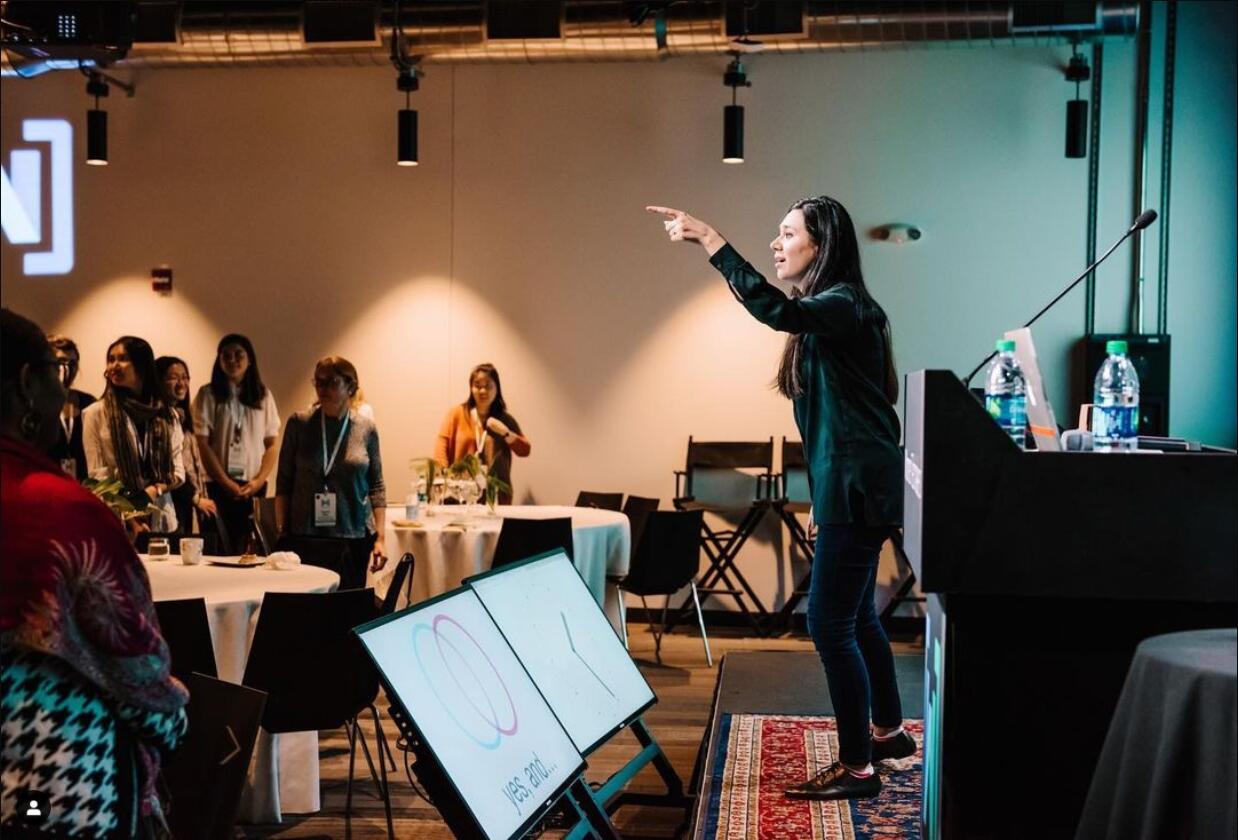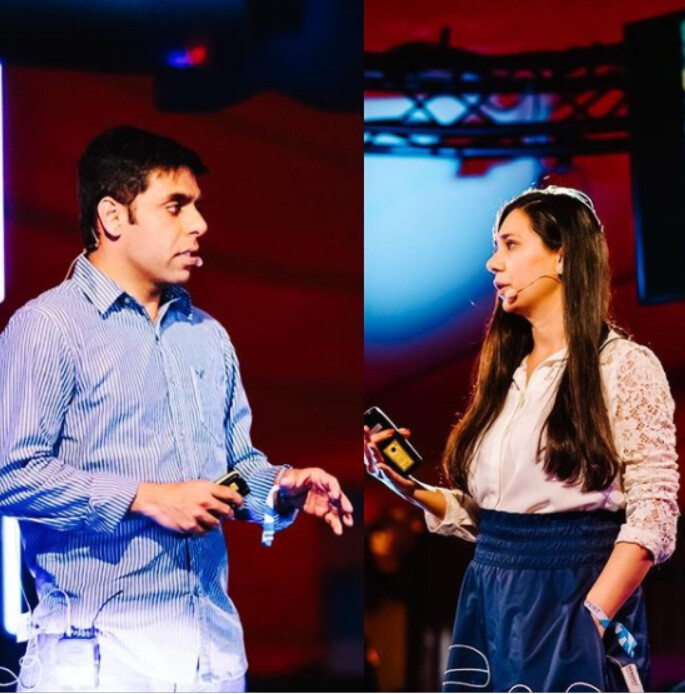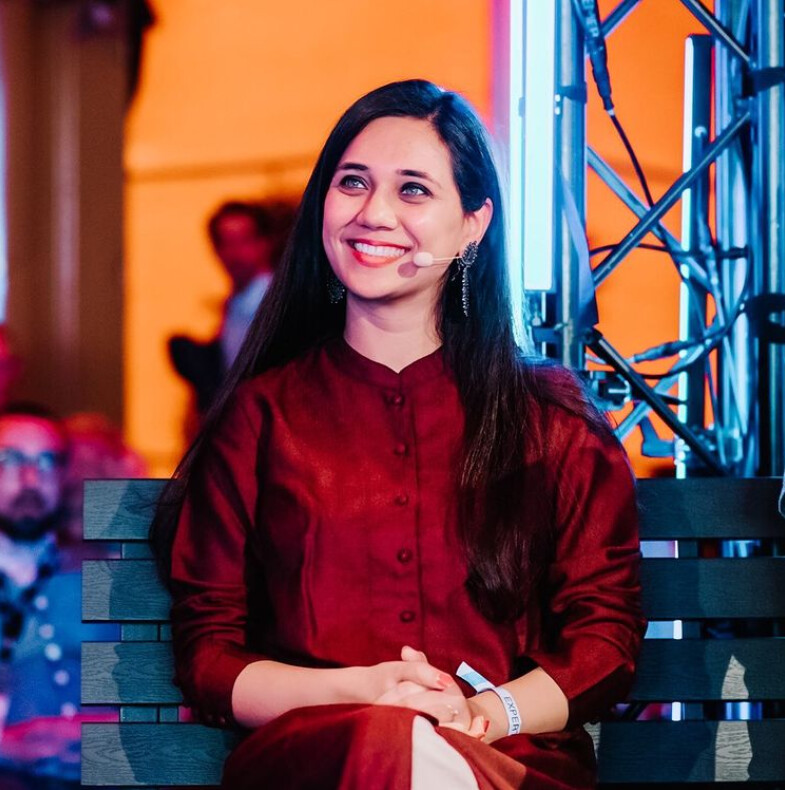Bored with school one day, 16-year-old Arjita Sethi asked her mother, Alka Sethi, whether she could become her business partner. Alka had established The School of English, a Delhi-based institute that gives students vocational training in communication, language and technology skills.
“She took me seriously but set some conditions. I had to give up most things a normal teenager would do and work on her venture seriously. After working on it for 7 years, our venture had trained nearly 100,000 students,” recalls Arjita, speaking to The Better India.
After leaving Delhi, she has gone on to start Equally, a venture-backed edtech startup that leverages the power of augmented reality (AR) alongside her husband Anshul Dhawan in San Francisco. She also started two more successful ventures called New Founder School and Indiarath.
Today, the 32-year-old has also co-founded Startup India Advisory, which ran the pilot Milestone Maker international program of the NASDAQ Entrepreneurial Center in India.
Arjita is also a lecturer at the San Francisco State University where she teaches entrepreneurship, creativity, innovation, and business ethics.
It’s an astounding resume. So, how did she get here in 16 years?

Silicon Valley Dreams
Born in Meerut, Uttar Pradesh, Arjita spent the first seven years living with her maternal grandparents in North Delhi.
Despite coming from a conservative Punjabi family, Arjita’s family, particularly her maternal grandfather, always encouraged her to dream big and not succumb to any petty limitations. “Besides inculcating a voracious reading habit, my grandfather would always encourage me to step out of India and discover different opportunities abroad,” she recalls.
After school, she went to college in Delhi to study physical therapy, following which she did a diploma course in theatre from the London Academy of Music and Dramatic Arts and her Master’s in Social Entrepreneurship from the Hult International Business School in 2014.
What brought Arjita and her husband, Anshul, together over a Facebook Messenger chat was talks of building their own startup. He was based in San Francisco at the time.
“We first connected over the startup my mother and I had started. He expressed admiration for the work we were doing,” she says, adding, “Although things were going well at his gaming company, he talked about a lack of inner fulfillment. After chatting for three weeks, we realised that we had the same startup idea. We then spoke on the phone for another three months, got to know each other better, fell in love and eventually, I moved to San Francisco in 2014. We’ve been married for the past seven years.”
Their startup, Equally, was inspired by Steve Jobs’ famous keynote speech at Stanford University. Their original plan was to work for a year in Silicon Valley, create a startup and work towards turning it into a unicorn. Alas, those dreams were shattered the moment she reached San Francisco.
Neither Anshul or Arjita had a Green Card at the time and as a result of their visa limitations, they couldn’t officially incorporate a company in Silicon Valley.
Moreover, it was difficult walking into meetings with potential investors and mentors being the only woman in the room. “But it dawned on me that I needed to leverage my unique identity as an immigrant and a woman in Silicon Valley. The perspective I have is global. But I also knew that network is net worth. Starting out, I was a nobody and had to develop my extensive network of mentors, investors and others from scratch,” she says.

The Da Vinci Club
In 2015, the couple began working on their first commercial product.
“Equally is an augmented reality platform. Oftentimes whenever a child is on a technological device, they lose track of their surroundings. When Pokemon Go came out, we realised that augmented reality was making people move instead of isolating people. In other words, AR was facilitating a socialising experience. What if we used this technology to help kids move around and learn from their surroundings? So, we created the Da Vinci Club, our first commercial product. Essentially, it’s a social game with a visual encyclopedia that makes kids move and explore the real world with their friends. We understood that parents weren’t too concerned with what kids were learning as much as seeing their children sit passively with a device in their hands,” explains Arjita.
They began building their first prototype after raising $20,000 through a small crowdfunding campaign and began testing their product visiting low-income neighbourhoods and schools in San Francisco. In 2016, the couple tested their second prototype with 2,000 children in five countries. In 2017, they tested their third prototype with more than 7,000 children using it. They wanted to ensure that their product was working for children in different parts of the world and even conducted these tests on their own.
It took about seven pivots to launch Da Vinci Club successfully. For the first six, the couple put in their own money and worked two jobs each because nobody else would fund them.
There were many difficulties and heartbreaks along the way. “I have seen days when there was -$200 in my bank account, while thinking about how we were going to pay for our groceries the next day. Living in San Francisco, the most expensive city in the world, there were also days when making rent wasn’t a guarantee,” she recalls.
There were also successes like reaching the semi-finals of the Global Learning XPrize sponsored by Elon Musk in 2017 with their very first product School of Games, an intelligent early childhood literacy game. Their venture grew, but no funding was forthcoming.
However, everything changed in 2018. Equally got selected in the xEdu Accelerator programme in Helsinki, Finland, which is “Europe’s leading business accelerator for edtech startups creating transformative learning solutions with pedagogical impact”.
“We received our first round of funding from Finnish impact investors in September 2018 purely based on our very first demo of the Da Vinci Club. That was the first ever validation we received for our idea. Only the day before our demo, my husband and I were thinking about how we would pay our rent,” recalls Arjita.
The same year she qualified for the “Aliens of extraordinary ability” (EB-1A) visa and received her green card. This meant the couple could now officially incorporate their startup in San Francisco. Her face even appeared on Nasdaq’s billboard in Times Square, New York. In November, they launched the Da Vinci Club and so far they have landed about 15,000 users on the platform across 7 countries. The following year, they received funding from the impact investors in Finland and early investors of Oculus VR.
“We have partnered with Education Alliance Finland to conduct further research on our products. Today, Equally has 20,000+ users onboard across all their products and is present in 12 countries across the world. Da Vinci Club has an app offering and a homeschooling offering (launched during COVID),” she says.

Enabling Startups
After successfully running their startup for about a year, the couple were close to burnout by August 2019.
“The hustle and grind is constant, working 20 hours a day and forgetting to sleep or eat your meals on time in a bid to reach unicorn status. Anshul and I decided that it’s time to shift towards a more holistic way where we also take care of ourselves,” she says.
A couple of months later, the world suffered the first outbreak of COVID-19. With more time on their hands, Arjita and Anshul sat in their one-bedroom flat in San Francisco to decide what the future held. They planned to build a school which helps other immigrant founders launch their dream startups with an emphasis on self-care, sustainable ideas, while dismantling outdated notions of extreme grind and hustle that defined past Silicon Valley ventures. In May 2020, they launched the New Founder School.
It’s a membership platform where potential founders pay $10 to $100 a month. Upon joining, they are asked a series of questions and carefully formulated algorithms tell them what their entrepreneurial journey could look like moving ahead. Depending on which stage these founders are at, the New Founder School takes them through different milestones offering them expert mentors, resource material and classes as well.
They address all manner of questions for founders on subjects like the process of starting their venture, incorporating it, framing contracts, splitting equity, approaching investors, etc.
“Even if a founder is suffering burnout, we have the best coaches at our school who talk to them and help them create a proper schedule. The experts include investors in my first venture. At our school, every founder undergoes a unique journey customised and personalised to their respective needs. We have experts not just from Silicon Valley, but from countries like Finland, Switzerland, Germany, India, Singapore and China and across different industries,” she says.
In the past eight months, the school has seen almost 250 graduates from nearly 35 countries and helped launch over 50 startups.

More Women In The Startup Space
A lot of the beneficiaries have been women founders, including Gaia Protection, a Costa Rica-based freelancers platform which is an Upwork for sustainable companies.
Anjali Nair, who lives in Florida, is another example. She is the founder of A Desi Girl in US, a startup looking to help immigrant women in the US thrive in their early years.
“I met Arjita on Instagram when I was in the idea stage of my business. I had gone through the phase of starting over a few years ago and wanted to bridge this gap of unknowns. My vision was to create a one-stop-shop with resources every new immigrant looks for when they move to the USA,” she says.
With Arjita’s guidance, Anjali successfully launched ‘Foreigner to Local in 80 days’. “It’s a group coaching program where we train women how to restart their career, learn American English, integrate with American culture, and regain their lost confidence,” she adds.
Similarly for India, Arjita started Indiarath to strengthen the national startup ecosystem alongside Yathin Thakur, founder of CoworkIn and serial entrepreneur, and Upasana Dash, CEO of Jajabor Brand Consultancy. The 24-week long incubator program has personalised sessions and coaching to enable startups of any scale with navigating any business challenge across verticals. The program is focused on three broad categories that include upskilling entrepreneurs to handle real challenges through fundamentals, business remodelling, product designing, branding strategy.
Mentors for India’s “largest borderless accelerator” include Google, Amazon, Facebook, Microsoft, Silicon Valley Bank, Morgan Stanley, Crisil, Cisco, Paytm and more. For the first batch, they received over 800 applications across 50 cities, of which 10 startups made the first batch. These are underestimated founders, who were not thought about or left behind.
The first batch started their course in November 2020. They are on the cusp of graduating. While some are at the stage of launching their startup, others have begun raising money.
Haindavi Dandu, the founder of Hyderabad-based printpackexchange.com, which helps users discover and connect with global printing and packaging manufacturers, OEM’s, service engineers and suppliers.
“The incubator programme was about developing my skills as a founder, addressing questions of how to approach potential investors, pivot my business and approach mentors. It was a very refreshing experience. The first class I had with Arjita was about personal branding and how to convey my story well to my customers or investors. That was a game changer. For any manufacturing unit to do well, it engages in cost-cutting or generates more revenue. Printpackexchange.com helps manufacturers address the first issue, but I wanted to address the second one. I had an idea, but was scared to pursue it,” says Haindavi.
While focusing on printpackexchange.com on a lower scale, Arjita asked her to immediately pivot her business to generate more revenue for packaging manufacturers.
“So I started Packlove.in about two months ago. It’s a packaging procurement platform, which helps packaging manufacturers increase their revenue by proactively bidding for buyer orders. We recently onboarded a CTO and CMO, who are also investors in the company. We will approach investors next month,” explains Haindavi.
Arjita says, “I had to work 10 times harder than my male counterparts. Although I’m not from a technology background, today I’m the CEO of a tech company in Silicon Valley. What’s really missing from the startup ecosystem is the lack of representation among women who are investors. That’s why I started doing angel investing a couple of years ago. Just last week, I did my sixth investment in a startup founded by a female founder. It’s not about men dominating. It’s about pattern recognition. Since men dominate the investor field, they see themselves in ideas posited by other male founders. Once women start doing this, that transition of seeing more of us in the startup space is going to happen.”
(Edited by Yoshita Rao)
No comments:
Post a Comment